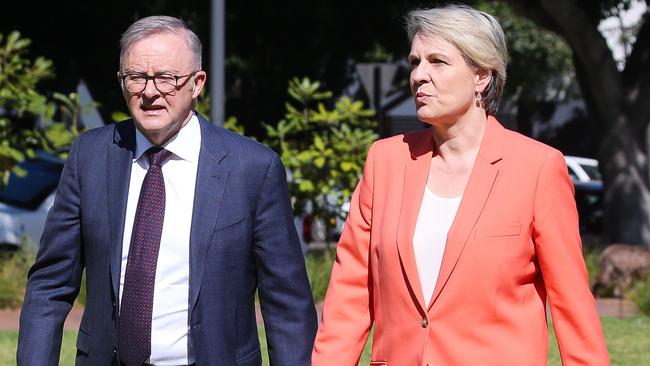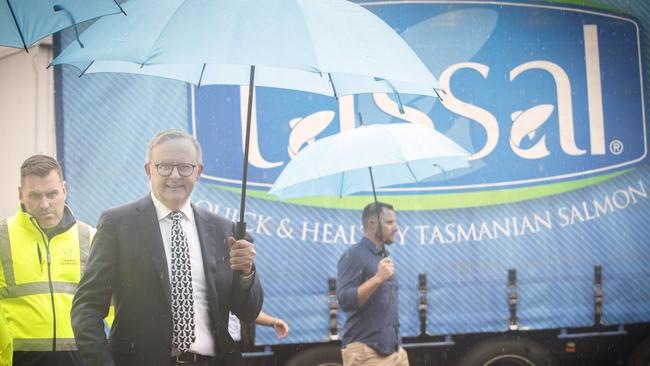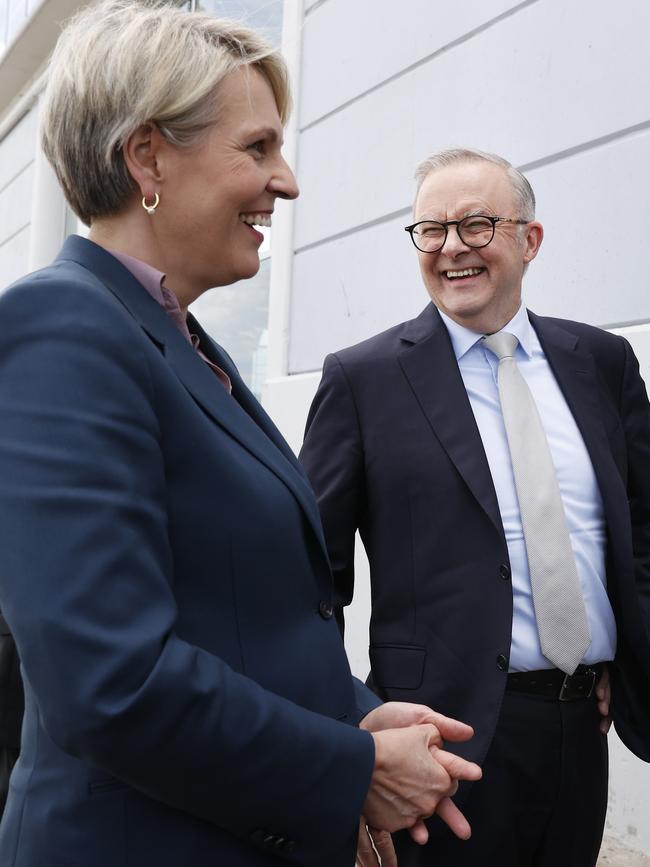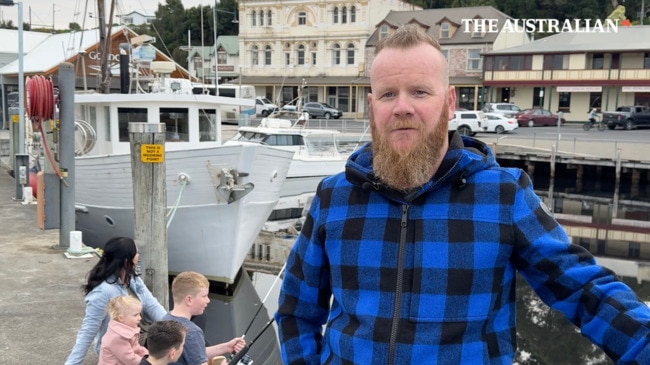Anthony Albanese denies rift with Tanya Plibersek amid tensions over environment calls
Speculation about a simmering rift between the two follows the PM sinking a deal with the Greens, and fears that threats to Tasmania’s $1.36bn salmon industry could cost Labor key votes.

Anthony Albanese has “absolutely” denied any speculation about an “internal feud” between himself and Environment Minister Tanya Plibersek following continuing reports about how he intervened and torpedoed an almost-clinched deal between Ms Plibersek and the Greens on the government’s environmental reforms.
The Prime Minister chastised the media for reporting on the issue, saying it was “extraordinary that the media want to concentrate on what didn’t happen as opposed to what did happen”.
Following the final sitting period of the year – potentially for this term of parliament – Mr Albanese asserted that voters should give Labor another term of government because “we’re working hard to make Australians’ lives better and Peter Dutton is blocking it”.
Mr Albanese said the decision to nix the Nature Positive reform was not a political one, following reports he torpedoed the bill after an appeal from mining-dependent and Labor-led Western Australia.
“This isn’t about politics, it’s about getting it right and we won’t support measures that don’t get it right,” he told ABC radio. ”We want to support industry to be able to operate effectively but also to operate in a sustainable way.”
Splits between Mr Albanese and Ms Plibersek are set to widen amid internal ALP concerns about leaking votes and losing seats in Tasmania, with the state’s $1.36bn salmon industry under threat from two drawn-out environmental reviews into an endangered fish.
Mr Albanese is expected to travel to Tasmania next month to allay concerns of hundreds of salmon workers who fear their jobs are at risk.
Despite legal hurdles and expected blowback from environmental groups, Mr Albanese is working through options to remove uncertainty for the economically vital salmon industry in a bid to shore up support in key election seats, including Braddon, Lyons and Bass.
New polling obtained by The Australian reveals the Liberals would comfortably hold the northwestern Tasmanian seat of Braddon and pick up votes in surrounding electorates if Labor’s self-inflicted salmon stand-off is not resolved. Agriculture and Fisheries Minister Julie Collins’ seat of Franklin would also be significantly affected.
Ms Plibersek has come under fire over long delays related to two reviews linked to the Maugean skate, including reconsideration of a 2012 Environment Protection and Biodiversity Conservation Act determination by the then Labor government approving large-scale salmon farming in Macquarie Harbour. A separate decision by the Threatened Species Scientific Committee on whether the skate should be listed as “critically endangered” was recently delayed by 12 months.
Opposition Leader Peter Dutton visited Strahan and Devonport, where a large proportion of Tasmanian salmon fisheries workers live, to promise locals that a Coalition government would reverse any adverse decisions made by Ms Plibersek. The Liberals are increasingly confident of holding the swing seat of Braddon despite the retirement of popular MP Gavin Pearce. They are also expecting Bridget Archer to hold neighbouring Bass, and believe they can win Lyons, where retiring Labor MP Brian Mitchell held on by 1344 votes at the 2022 election.
Senior government members, including Finance Minister Katy Gallagher, who is close to Mr Albanese, are understood to have expressed private concerns over the political fallout of Ms Plibersek’s two reviews, which some Labor figures believe could replicate Mark Latham’s disastrous 2004 election forestry policy.

Mr Albanese, who in January visited Tassal’s salmon processing plant and last month announced a $28m commitment to improve water quality in Macquarie Harbour, is understood to have made clear his position that Labor supports a thriving salmon industry in Tasmania.
This position, which backs major brands including Huon Aquaculture, Petuna and Tassal, is endorsed by Labor’s Braddon candidate, Senator Anne Urquhart, former state leader and Lyons candidate Rebecca White, and Labor’s state MPs.
A spokeswoman for Ms Plibersek on Sunday told The Australian the Environment Minister “will listen to the science and follow the law, as she is required to do”. Department officials in Senate estimates hearings recently confirmed there was no decision brief yet on the wider EPBC review.
In relation to the Threatened Species Scientific Council review into the status of the skate, Ms Plibersek’s spokeswoman said “the minister has granted a request from the independent scientific experts for more time to consider substantial and highly technical comments they received during public consultation”.
With the salmon industry contributing $770m annually to the Tasmanian economy and supporting more than 5100 local jobs, The Australian can reveal the Liberals will weaponise Labor’s salmon fight and splits between Mr Albanese and Ms Plibersek to woo northern and central Tasmanians.
In a campaign strategy note sent to Liberal Party state director Sam McQuestin and president Michael McKenna on Sunday, Tasmanian Liberal senator Jonno Duniam said the “Labor Party are putting the interests of inner Sydney before Strahan”.

“It is my firm view that in the upcoming election we cannot only retain Braddon and Bass, but I also believe that we can gain a third seat in Lyons. A third Senate seat is also in play with a statewide emphasis on the importance of upper house votes,” the opposition environment, fisheries and forestry spokesman wrote.
In the note obtained by The Australian, Senator Duniam said Mr Dutton had made clear the Coalition would be the “best friend” of mining and other industries including salmon aquaculture, while Labor was pushing an “anti-jobs agenda in lock-step with the Greens”.
Senator Duniam wrote that representatives from Tasmanian industries, including salmon and mining, had recently walked away from meetings with Ms Plibersek in Canberra believing the Environment Minister was “on the cusp of announcing even more adverse EPBC decisions”.
“If Minister Plibersek decides to shut down salmon aquaculture in Macquarie Harbour, it will cost 400 direct and thousands more indirect jobs, locals will be forced to move, and services would close. Even the Strahan Primary School could face closure,” he wrote.
Industry leaders are concerned that if Ms Plibersek adversely rules on expanded operations in Macquarie Harbour, other fisheries and projects could be targeted by activists led by the Bob Brown Foundation, Environmental Defenders Office and Australia Institute.
West Coast Council Mayor Shane Pitt said he had advocated to Mr Albanese and Ms Plibersek that they “should stop the EPBC review” and let the industry and workers “get on with their life”.
“It’s been over 12 months now that this has been hanging over their heads. They’ve put their lives on hold. There’s issues with children, do they enrol them in school next year because they’re not sure whether they’ve got a job? People have stopped buying houses because they’re not sure what their future holds,” Mr Pitt said.
“This is not just about Strahan. We talk about 400 jobs, some of these are on the northwest coast, in Devonport. It affects all of Tasmania.”

Mr Pitt acknowledged the Prime Minister was grappling with the legal ramifications of intervening, which could “open the gate” for court action by minority groups.
“But if everything is done the right way, there should be no comeback legally wise. I think that’s why he has been cautious,” he said.
“We’ve heard from Peter Dutton that if a decision is made in the negative for the industry, if they get elected they will change that. There’s certainly a big political push from both sides. Both Liberal and Labor at a state level are right behind the industry.”
Salmon Tasmania chief executive Luke Martin, who is leading engagement with the government on behalf of the industry, said “we’ve been consistent for 18 months that we’ve got confidence in the science of our ongoing operations in the harbour”.
“The industry has been operating there for 35 years. It is literally responsible for one in two jobs in Strahan, but across northwest Tasmania we’ve calculated it at 395 jobs. In (a) Tasmanian context that is a very big economic generator in regional Tasmania and you can’t just lead an industry like that and the workers on indefinitely, and unfortunately that’s the sort of message that we’ve been getting out of Canberra,” Mr Martin said.
“It’s an incredibly confusing process. The EPBC is something people on the ground don’t understand how it works. It’s created a lot of uncertainty not just for our workers but their families and everyone following this across Tasmania.
“We’ve got confidence that the Prime Minister values the industry. He’s made that point clear when he’s been in Tasmania. I think he absolutely sees a future for the industry in the harbour. We think that the Prime Minister certainly gets it and he wants to see a resolution to this but it’s a very challenging process to navigate the EPBC approvals and Minister Plibersek’s the person who’s got overall oversight of that, and it’s all sitting on her.”



To join the conversation, please log in. Don't have an account? Register
Join the conversation, you are commenting as Logout